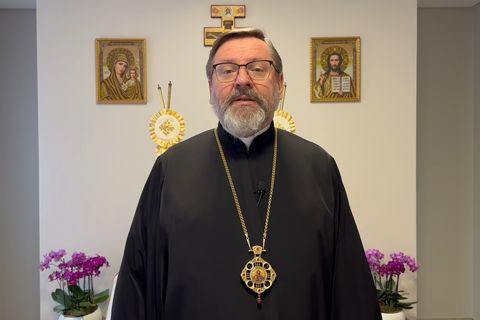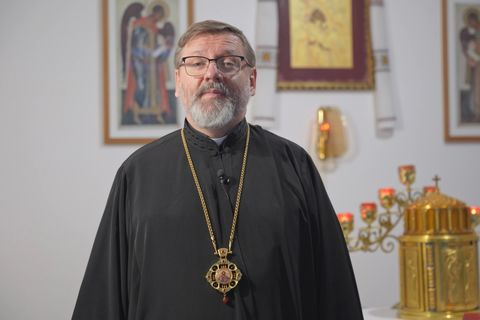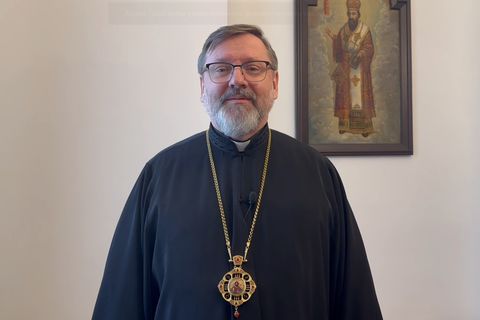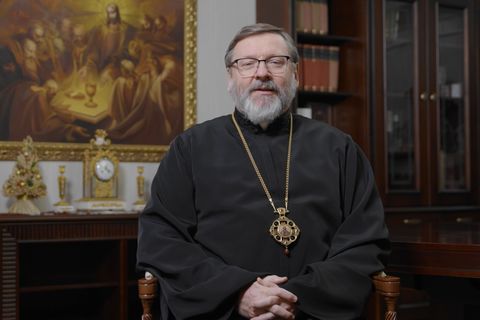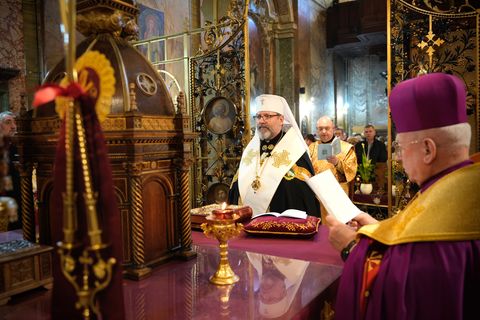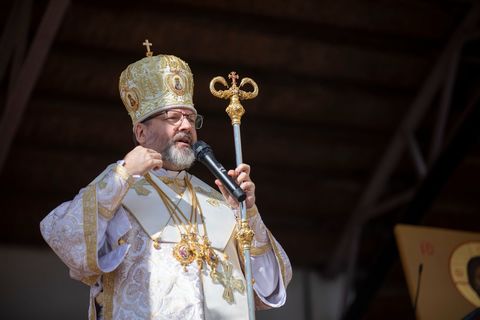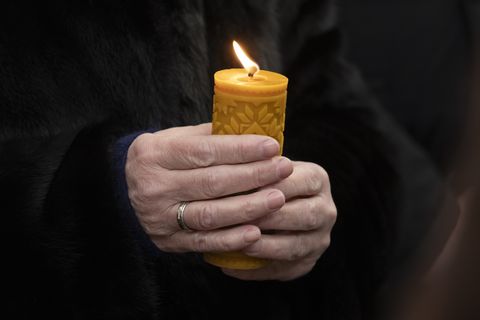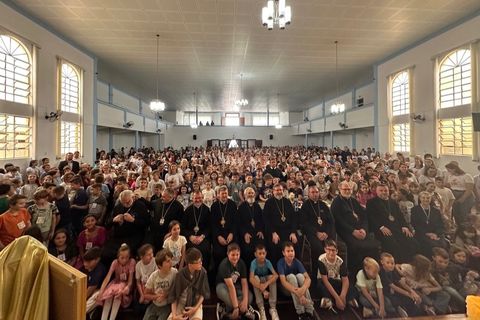Video Message of the Head of the UGCC on the 193th Week of the Full-Scale War, October 26, 2025
Glory to Jesus Christ!
Dear brothers and sisters in Christ!
It has now been 193 weeks since the Russian army invaded peaceful Ukrainian territory — 193 excruciating weeks that have once again spilled a river of blood and tears across our fertile Ukrainian land. Today again, we thank God and the Armed Forces of Ukraine for keeping us alive and allowing us to serve God, our people, and our nation.
This week has been marked by fierce fighting on the front lines, tremendous effort in the rear, and heroic service to the most vulnerable amid this war. Our brave soldiers — men and women alike — are not only holding back enemy assaults and thwarting their so-called summer or autumn offensive, but are also counterattacking and liberating our cities and villages.
We pray for them, for their families, and for all who have suffered from this terrible war. We ask God to heal the wounds inflicted by this great tragedy. We pray for our brothers and sisters held in Russian captivity, in prisons and torture chambers, especially in the occupied territories. We remember the families of our fallen heroes.
This week, the Russians have systematically attacked and destroyed the critical energy infrastructure of our cities and villages every night. In particular, the Chernihiv region has been deliberately targeted. The city of Chernihiv, home to thousands, suffered a major blackout, and parts of the region have been without light and heat for several days. We are forced to bring in water so that people can survive in these harsh conditions as temperatures continue to drop.
We are deeply grateful to all the volunteers who, in such cold, dark, and difficult circumstances, bring warmth to our people and carry the light of Christian hope.
What happened in Kharkiv has also caused excruciating pain in our hearts: the Russians attacked a kindergarten with drones. This is something truly shocking. Thank God none of the children were killed, though they all remain in a state of severe stress and shock after this horrific attack.
In Kyiv’s Podil district, a Russian drone also struck a synagogue. Several people were killed and four were wounded.
Once again, we appeal to the international community to say a clear and decisive “No” to Russian aggression. Despite these dreadful circumstances, we affirm once more: Ukraine stands, Ukraine fights, Ukraine prays!
This week was marked by the meaningful visit of the Ukrainian Council of Churches and Religious Organizations to Norway, and in particular to its capital, Oslo. It was very important for us to convey the voice of ordinary people from Ukrainian civil society to our international partners. We are grateful to the royal family for the meeting and for the attention they paid to our community in Norway.
I had the opportunity to ask the King and Queen for their personal patronage of our community, which is in great need of support. Our motto of pastoral care in the diaspora — “Integration – yes, assimilation – no” — must also be implemented in this country. Interestingly, the King himself responded to this request with his own testimony. He recalled that he too had once been a refugee: as a three-year-old boy, he was forced to leave Norway with his family when the country was occupied by the Nazis. The Queen, in turn, recalled how, as a little girl, she saw the joy of her people when the Nazi occupiers left her homeland. And she wished that the sons and daughters of the Ukrainian people might soon experience that same joy — the joy of liberation, the joy of victory.
A central theme of our meetings and conversations was interfaith and interchurch unity — the search for ways to achieve unity among Christians in Ukraine, a movement we call the ecumenical movement.
Our meeting with the head of the Lutheran Church of Norway, the largest denomination in the country, Rev. Dr. Olav Fykse Tveit, was particularly significant. He is not only the current head of this Church but also the long-time General Secretary of the World Council of Churches. He understands better than anyone the danger of manipulating the idea of ecumenism — especially the kind of manipulation that comes from Moscow.
That is why we began to discuss a new type of ecumenism — not theoretical but practical; not ecumenism as a matter of diplomatic negotiations or compromises, but as a sincere striving for unity among Christians. We testified that in Ukraine today we stand together before the same challenges — what we called existential challenges. Standing before the mass graves of our faithful, we realized that on this border between life and death, we are all the same — Orthodox and Catholics, Protestants, Jews, and Muslims alike. Thus, a joint response to these Russian crimes against humanity in Ukraine is giving rise to a new kind of unity in action. We have called this new unity among Christians in Ukraine existential ecumenism — a unity that today compels and invites us to live, pray, and work together, and to be the voice of our long-suffering people before the world community.
Today, we express our gratitude — both in the context of our visit to Norway and in all our other encounters — to all people of good will from different nations who support us, pray for us, send humanitarian convoys to Ukraine, and help us Christians to carry out our social ministry in our homeland.
Today, once again, we join all nations and all Christians around the world in praying for peace in Ukraine. And we implore: Lord, stop the war. Only You can bring peace to Ukraine. Lord, enlighten the hearts and minds of the powerful of this world with the light and grace of the Holy Spirit, that they may find a way out of the dark corner into which Russian aggression is driving humanity.
God, bless our long-suffering Ukraine with Your righteous, heavenly peace.
The blessing of the Lord be upon you, through His grace and love for mankind, always, now and forever, and for the ages of ages. Amen.
